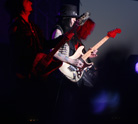  .jpg)
It begins with the quivering hush that settles as dusk falls over Parcul Carol I, a breath suspended between ancient colonnades and the stories their limestone pores have absorbed. Arenele Romane, aglow in anticipation, is not a blank stage tonight: beneath arching summer trees, the air carries a thrum, both nervous and reverent. At ground level, a banner bearing the unmistakable Skunk Anansie insignia trembles in the warm draft, each flutter a promise that something indelible is about to occur. There’s no riotous fervor yet, only the close, collected energy of a city old enough to recognize an epochal event before it erupts.
Across the stone, echoes of the band’s history flicker—memories from the late '90s, the biting political commentary, Skin’s chrome-plated howl, the sight of Cass’s bass lines coiling through the nervous system of a thousand-strong crowd. But tonight, these aren’t just echoes; they’re prelude. For Bucharest, having weathered its own revolutions and resurrections, knows what it means for a wound to become an anthem. Here, beneath Capitol-acoustic domes, Skunk Anansie is not just returning. They are rewriting the story of survival, with every cord, every lyric, tuned sharper than ever to the sublime ache of the present moment.
From Apocalypse to Rebirth: The Evolution of Skunk Anansie
The band approaching the Arenele stage is both the Skunk Anansie of mythic memory and a bold new incarnation honed by adversity and unsparing self-reflection. Since forging their reputation amid the twilight of Britpop and the sonic turbulence of the 1990s, Skunk Anansie have never embraced nostalgia’s comfort. Even as nearly three decades in music might have warranted a restatement of old glories, but the “Weak” that made audiences weep; the “Hedonism” that carved a space for black, queer anger and desire in British alt-rock, they have instead pressed forward.
After a nine-year studio pause (punctuated by sporadic singles, the 25th-anniversary tour, and Skin’s own flowering as cultural icon and The Masked Singer muse), Skunk Anansie didn’t just return in 2025. They detonated the boundaries of their own legend with the release of The Painful Truth. The record is not a plea for relevance nor a self-congratulatory greatest hits retread. It is rebellion distilled, and an album born of Cass Lewis’s battle with cancer, of the neardissolution of the band, of Skin’s recurring grappling with imposter syndrome and the fraught temptation of creative comfort.
Listening to Skin and Cass in recent interviews, the honesty is palpable: fear of irrelevance, the pressure to experiment, the refusal to lapse into self-parody. “There’s a difference between being comfortable and being boring…. The only way to be fresh and modern and relevant is to try a bunch of new shit and that’s what we did on this album,” Skin remarks, exposing the engine of their current urgency.
The Painful Truth is both the result and the chronicle of this struggle, and the the band locked in a shared crucible, discarding and rebuilding tracks (“Animal,” for example, evolved across years and pandemic loss), landing finally on work that is not only “undeniably Skunk Anansie” but also terrifyingly present: raw, glinting, and unvarnished with easy nostalgia.
Their public persona, and always a confluence of bristling activism, sensuality, and sly British humor, and now feels peeled closer than ever to the bone. “You have to get comfortable with vitriol,” Skin explains, a lesson earned in both the arena and the press. Gone is any armor of irony; what remains is the band’s undeniable honesty, aging not toward resignation, but toward unflinching invention.
|




.jpg)




